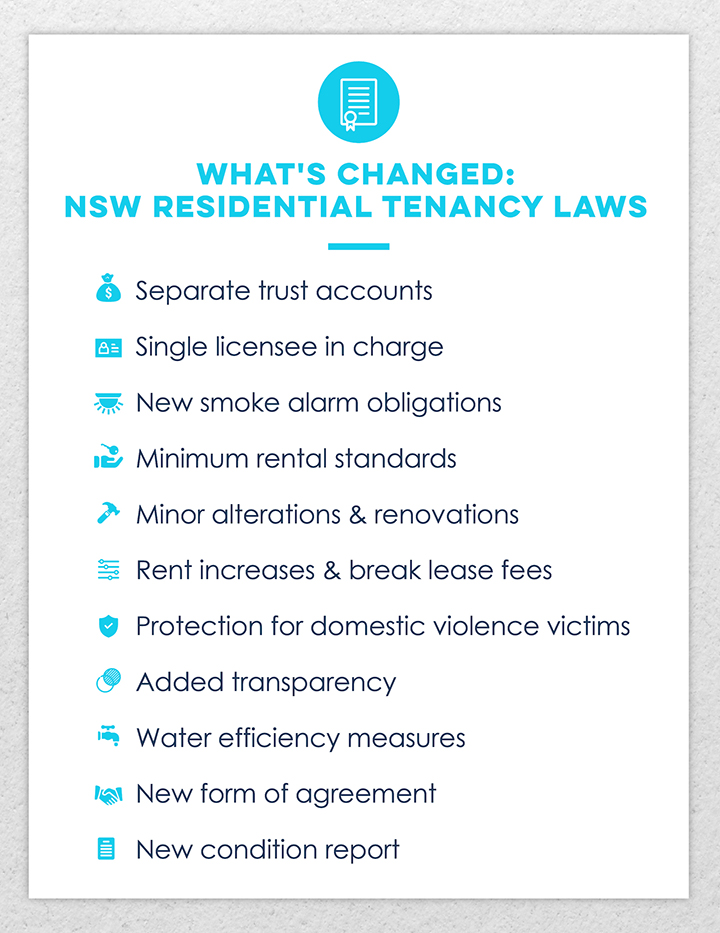March 22nd, 2021
Our response to the Victorian rental reforms
PropertyMe
Industry News

According to the Real Estate Institute of New South Wales (REINSW), the NSW Office of Fair Trading has announced “sweeping changes” to the Residential Tenancies Amendment (Review) Act 2018 and the Residential Tenancies Regulation 2019.
The new NSW residential tenancy laws came into effect on 23 March 2020. REINSW President Leanne Pilkington said “Significant changes” have come into place, affecting property managers, landlords and tenants. Here’s a breakdown of what’s changed:
Under the new reforms, property managers must have separate rental and sales trust accounts. The licensee in charge of an agency must ensure that there are separate trust accounts for rental money and sales money and that money from rentals and sales are paid into the appropriate accounts.
Only the licensee in charge is be able to approve trust account transactions. In the regulation, it states that “a real estate agent may not authorise the withdrawal of money from a trust account unless the real estate agent is the licensee in charge of the business to which the trust account relates.” Agencies must nominate a licensee in charge.
In addition, the licensing system has been restructured, functions have been restricted for different licences and qualification requirements have increased.
Landlords and property managers need to ensure smoke alarms installed in rental properties are in working order. Failure to comply will result in hefty penalties.
To ensure smoke alarms are in working order, the landlord or property manager must:
Conversely, tenants must notify their landlord or property manager if they discover that a smoke alarm is not working, or if a battery needs to be changed. For hardwired smoke alarms, repairs and replacements must be carried out by a licensed electrician. Here are further details around smoke alarm requirements for rental properties.
Note that the existing provision that allows landlords to enter the rental property without consent has been extended to include inspecting or assessing the need for repairs or to replace a smoke alarm. However, proper notice must be given to the tenant.
If you’re a PropertyMe subscriber, Reminders can you help keep track of smoke alarm and pool compliance, as well as more general tasks like knowing when your owner’s landlord insurance policy is expiring. Here’s how to apply Reminders to your properties.
Find out why PropertyMe is Australia’s #1 property management software.
Book a free demo with our friendly team – it’s super easy Book a demo
All rental properties must meet the following seven requirements at the start and throughout the tenancy to be considered fit for habitation:
NSW Fair Trading noted that the above requirements are baseline standards. Meeting them does not automatically mean that the property is fit for habitation. For a full list of requirements, please check out NSW Fair Trading.
Furthermore, NSW Fair Trading now has the power to issue rectification orders if tenants require urgent repairs or maintenance.
Tenants are now able to make minor alterations, additions or renovations. The landlord cannot unreasonably withhold consent if the alteration, fixture or addition is one from the prescribed list in the new regulation. However, the tenant will still have to obtain written consent from the landlord.
These minor alterations, additions or renovations include:
The landlord may require that the following changes be carried out by a qualified person:
However, these changes do not apply to properties that are listed on the loose-fill asbestos insulation register or if the property is a heritage item.
Tenants are still be liable for any damage they cause to the rental property and must leave the property in the same condition as at the start of the tenancy, except fair wear and tear. This means that any alterations, additions or renovations must be fixed or removed at the end of the tenancy.
If the work is not done in a satisfactory manner, landlords and property managers may apply to the Tribunal to seek compensation from the tenant.
For periodic leases, rent increases are limited to once a year. This does not apply to fixed term leases that are less than two years in duration that specify when, and how much, rent is increased by.
For all new fixed-term leases that are three years or less, the following break fees apply:
Additionally, with fixed-term agreements of 20 years or more, the Act is flexible. However, you cannot modify or exclude the following mandatory terms:
Victims of domestic violence are able to terminate their tenancy immediately and without penalty. In the event that a tenancy is terminated due to domestic violence, landlords and their agents are prohibited from listing the victim on a tenancy database.
Note that these provisions came into effect on 28 February 2019. Further information can be found here.
The new NSW residential tenancy laws strengthen information disclosure requirements. The reforms now prohibit tenancy database operators from charging tenants to access their own personal information held on the database.
Additionally, before a tenancy agreement is signed, the landlord or property manager:
Furthermore, landlords and property managers must obtain the tenant’s prior written consent to publish photographs or video recordings of premises. This includes property interiors for advertising purposes which may show the tenant’s possessions.
The new standard form of agreement and condition report are available in the new regulation.
If the landlord or property manager fails to comply with any of the information disclosure obligations, a tenant is able to end their tenancy agreement by giving at least 14 days’ notice or by applying to the Tribunal for an order to end the tenancy. Plus, the Tribunal can order the landlord to reimburse the tenant for any costs incurred as a result of ending the tenancy agreement.
For new and existing tenancy agreements, the landlord can only pass on water usage charges to the tenant if the property is separately metered, meets water efficiency measures, and the charges do not exceed the amount payable by the landlord.
Additional water efficiency measures include:
All toilets in rental properties must be dual flush with a minimum three-star rating in accordance with the Commonwealth Water Efficiency Labelling and Standards (WELS) scheme. Landlords who are considering replacing or upgrading existing toilets should consider installing dual flush toilets.
The standard form of agreement and condition report have been updated to increase transparency and reflect the new laws.
Condition reports have been improved by:
The new standard form of agreement and condition report are available in the new regulation.
If you’re a PropertyMe subscriber, entry and exit inspection reports have been updated to comply with the new residential tenancy laws. We’ve also made the forms more printer-friendly. Check out our Knowledge base article for more information.
The NSW residential tenancy laws have come into effect on 23 March 2020.
The Residential Tenancies Act 2010 has been amended by the Residential Tenancies Amendment (Review) Act 2018 and the Residential Tenancies Regulation 2019 has replaced the current Regulation.
For more information, please visit NSW Fair Trading and NSW Legislation:
Here’s a summary of the NSW residential tenancy law changes for your convenience:

If you enjoyed this blog post on NSW residential tenancy laws, you might also be interested in Industry Experts Reveal Real Estate Predictions for 2020 and What the Queensland Rental Reforms Mean For Landlords and Tenants.
Let us know your thoughts on What’s Changed: New NSW Residential Tenancy Laws by emailing [email protected].